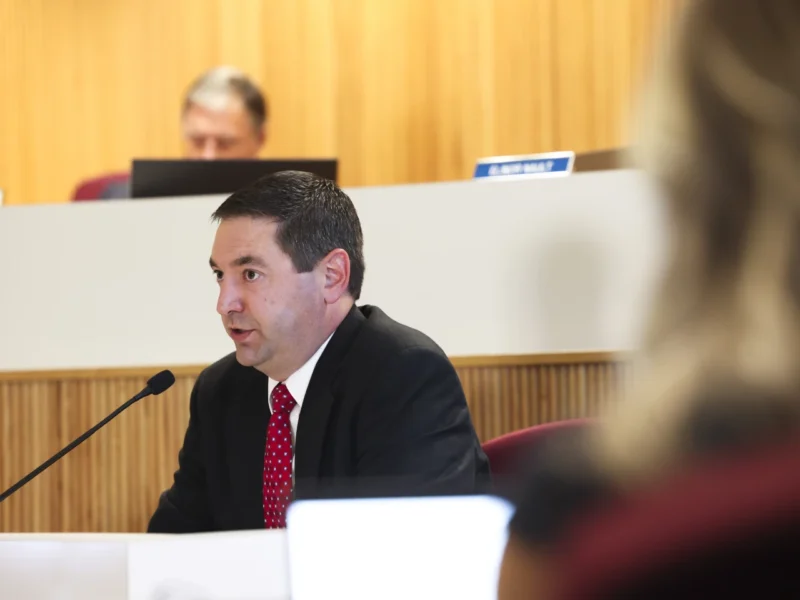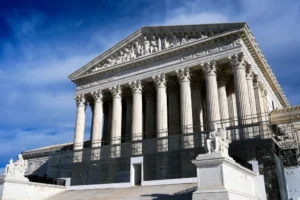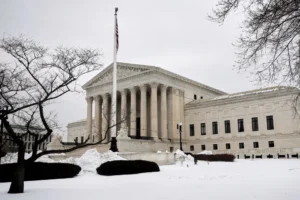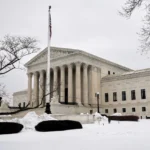Montana’s Attorney General Defends Actions at Hearing on 41 Counts of Professional Misconduct
- Published In: Politics
- Last Updated: Oct 10, 2024

Montana Attorney General Austin Knudsen testifies in his own professional misconduct trial before the Commission on Practice in the Montana Supreme Court Chambers on Wednesday, Oct. 9, 2024, in Helena, Mont. (Thom Bridge/Independent Record via AP)
By AMY BETH HANSON
HELENA, Mont. (AP) — A succession of controversies marks Republican Austin Knudsen’s nearly four years as Montana attorney general.
His office sided with a man who made an armed threat over a pandemic mask mandate and was accused of pressuring a Helena hospital over its refusal to administer a parasite drug to a COVID-19 patient. He tried to block three constitutional initiatives from the November ballot, recruited a token opponent for the June primary so he could raise more money, and got sued after forcing the head of the Montana Highway Patrol to resign.
Knudsen testified at a hearing Wednesday that could bring a reckoning in yet another dispute: allegations of professional misconduct over his aggressive defense of a law that allows Montana’s Republican governor to directly fill judicial vacancies. That law was part of a nationwide GOP effort to forge a more conservative judiciary.
A judicial disciplinary office concluded in 2023 that Knudsen’s office tried to evade the state Supreme Court’s authority by rejecting the validity of court orders.
His hearing before a state judicial panel on 41 counts of professional misconduct could last up to three days, officials said. It’s not clear when the panel will make its recommendations on whether Knudsen violated rules of practice and whether he should be disciplined.
Knudsen, who could lose his law license, argues he and his staff were “zealously representing” the Legislature in an a separation-of-powers case. The subpoena powers of the Legislature and whether the courts had the authority to quash them, had not yet been litigated.
“This was a high stakes constitutional litigation and a clash between co-equal branches of government,” said Christian Corrigan, Knudsen’s attorney.
Knudsen conceded Wednesday that the zealousness may have gone a bit too far.
“If I’m being really honest, in hindsight, I think a lot of things could have been done differently and probably should have been done different here,” Knudsen said. “If I had this to do over, I probably would not have allowed language like this — so sharp — to be used. But we and our client truly felt that we were in an absolutely novel situation of constitutional emergency and this is the language that went out.”
Republicans have long accused Montana judges of legislating from the bench when the courts find Republican-passed laws regulating abortion or gun rights to be unconstitutional. In this case they questioned whether the justices should be hearing a case about whether they had the power to quash a legislative subpoena that involved their court administrator.
The alleged misconduct by Knudsen and his staff occurred in 2021. At the time, Montana lawmakers were working on a bill to eliminate a commission that reviewed potential judges.
Lawmakers learned a Supreme Court administrator used state computers to survey judges about the legislation on behalf of the Montana Judges Association. After the court administrator said she had deleted emails related to the survey, the Legislature subpoenaed the Department of Administration, which includes the state’s IT department, and received 5,000 of the administrator’s emails by the next day.
The Montana Supreme Court later quashed the subpoena, but not until after some of the emails had been released to the news media.
Then-Chief Deputy Attorney General Kristin Hansen, now deceased, responded to the Supreme Court writing the “legislature does not recognize this Court’s order as binding” and added that lawmakers wouldn’t allow the court to interfere in its investigation of ”the serious and troubling conduct of members of the judiciary.”
Knudsen testified Wednesday that Hansen, who was a former legislator, “was quite agitated and she wanted to use some quite strong language to push back and assert the legislature’s position.”
The Legislature had also moved for the Supreme Court justices to recuse themselves from hearing the case, arguing that justices had a conflict of interest because the subpoena involved the court administrator. The justices denied that motion and suggested that the Legislature had tried to create a conflict by sending each justice a subpoena for their emails.
In a May 2021 letter to the court, Knudsen said the justices’ writings “appear to be nothing more than thinly veiled threats and attacks on the professional integrity of attorneys in my office.” He added that “lawyers also have affirmative obligations to report judicial misconduct.”
Timothy Strauch, a special counsel with the Office of Disciplinary Counsel, repeatedly asked Knudsen if language in motions and letters his office submitted to the court were disrespectful, intemperate, contemptuous, insulting or undignified in violation of the rules on practice. Knudsen repeatedly answered “no.”
Knudsen’s office in late 2021 asked the U.S. Supreme Court to take up the subpoena case, claiming judicial self-dealing on a possibly unprecedented scale. The justices declined.
Montana’s Supreme Court ultimately upheld the law allowing the governor to appoint judges.













